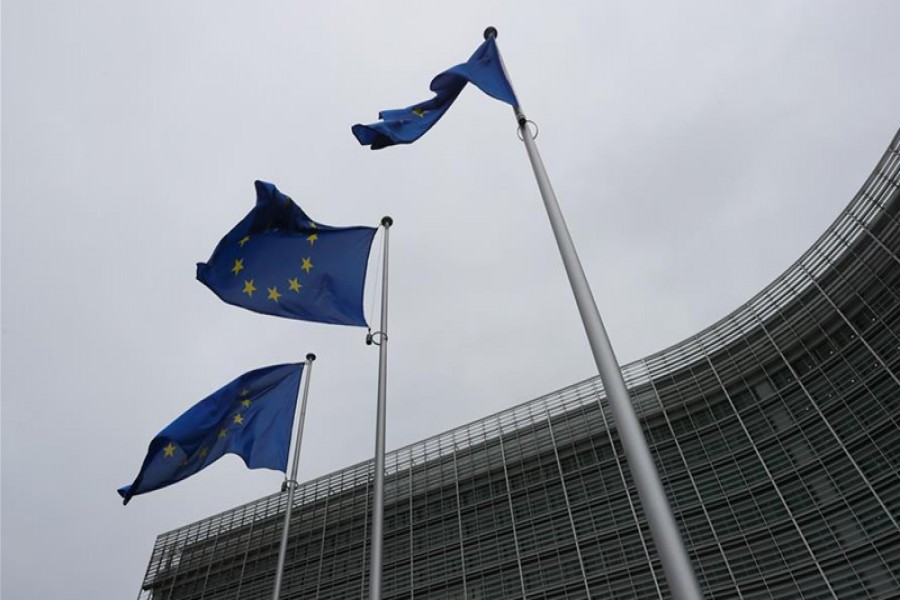China and EU Tuesday convened one of their most important meetings of the year, steering the vessel of bilateral economic ties toward a reassuring recovery from the COVID-19 pandemic.
The two major economies joined hands despite a US-led rift on multiple fronts that tends to baselessly portray China as a threat. This cooperation will arguably set the world on course for much-needed inclusive growth as the raging coronavirus still haunts the globe, international affairs watchers said.
Chinese Vice Premier Liu He and Valdis Dombrovskis, Executive Vice President of the European Commission, jointly presided over the eighth China-EU High-Level Trade and Economic Dialogue (HED) via video link Tuesday, according to the Xinhua News Agency.
The dialogue revolves around opening a new dimension of bilateral cooperation in the post-COVID-19 era and leading a stable global economic rebound and growth.
The two sides have reached fruitful results and consensus in terms of cooperation in a range of areas, including the joint fight against COVID-19, global economic governance, industrial chain safety, a bilateral investment treaty, WTO reform, expanding market opening-up, digital economy, finance and taxes.
The coronavirus is a common challenge for humanity. China and the EU as two major economies are pushing a global unified approach in the fight against COVID-19 and for an economic rebound, and are jointly safeguarding multilateralism and free trade, Liu said, according to Xinhua. The EU and China are important partners and advancing bilateral relations serves the common interest of both sides, Dombrovskis stated.
Cui Hongjian, director of the Department of European Studies at the China Institute of International Studies, told the Global Times Tuesday that the opening of the HED is of great significance, underscoring that regular communication mechanism between the two economies is resuming gradually.
"There are three high-level dialogues being held between the two sides every year concerning diplomatic, economic and cultural communication. We have so far seen the resumption of two dialogues," Cui said.
In June, China and EU held the 10th round of high-level strategic dialogue via video link, with both sides vowing to develop closer ties.
Against the backdrop of fraying political ties over Brussels' blasts against Beijing involving Hong Kong and Xinjiang, Chinese observers said that holding the HED has sent positive signals over bilateral relations.
Both sides have displayed calmness, with the EU side in particular not bowing the pressure from the Washington and maintained an independent economic development path from the US, Cui noted.
Analysts predict that the bilateral investment treaty (BIT) and joint efforts to stabilize industrial chains could be high on the HED agenda.
China may open up more fast-track channels for the entry of personnel of foreign companies based on the principle of reciprocal treatment. Also, more positive signals on the progress on the BIT may be released after the meeting concludes, according to Cui.
In the post-virus era, China and the EU are both in urgent need of deeper economic ties with each other, analysts said.
Zhao Junjie, a research fellow at the Chinese Academy of Social Sciences' Institute of European Studies, told the Global Times that the dialogue shows that the two economies are joining hands to endure hardship at a pivotal time of economic rebooting from the fallout of the coronavirus pandemic.
"This is a way of communicating back and forth to minimize differences and reach consensus," Zhao said. He added that as trade and economic ties serve as the cornerstone of China-EU relations, most European countries will prioritize economic gains and part ways with the US.
"The European bloc, as a whole, is not monolithic. They could be split to tilt the scale to the Chinese side if they are incentivized," Zhao added.
As Cui put it, "the EU is eager to deepen cooperation with China - the first nation in the world to walk out of the shadow of the coronavirus outbreak and achieve positive quarterly economic growth - to shore up its virus-hit economy. On the other hand, China also looks to stabilize investment from the EU amid the Washington-led blockade of Beijing's rise."
China is on course to become the only major economy to post a positive growth this year, according to the IMF's latest global economic outlook projections. The Washington-based fund put China's growth at 1.0 per cent for 2020 and forecast it to rise to 8.2 per cent in 2021. The economy of the euro area is estimated to contract 10.2 per cent this year before rebounding to 6.0 per cent the next year.
A noteworthy breakthrough was the recent signing of the China-EU agreement on geographical indications.
The agreement is the first major trade deal between the two sides in recent years, demonstrating Chinese government's firm resolve to push a new round of high-level opening-up and the protection of intellectual property rights, China's foreign ministry said last week.


